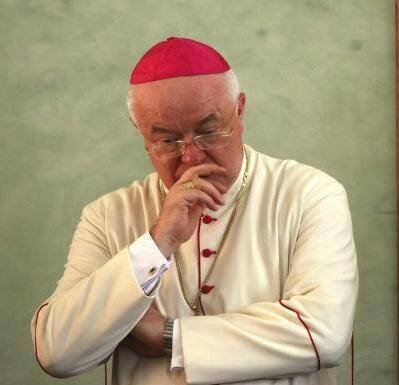The former nuncio to the Dominican Republic, Archbishop Jozef Wesolowski, was placed under house arrest on Sept. 23 to prevent him from escaping justice or tampering with evidence, the Director of the Vatican Press Office, Fr. Federico Lombardi, S.J., told reporters today.
He will be tried at the end of this year or in the first months of 2015, once the preliminary criminal investigation has been completed, Fr. Lombardi stated. This preliminary work involves gathering further evidence and interrogating witnesses, and could take a few more months.
The criminal trial will be conducted according to the penal code that was in force before the reform approved by Pope Francis in 2013, because the alleged crimes took place before the new code came into effect.
If convicted, the Polish-born prelate who was ordained priest and bishop by Pope John Paul II could be sentenced to up to seven years in prison, or more if aggravating circumstances warrant it.
Msgr. Wesolowski was summoned to the Vatican Tribunal at 3:00 p.m. (local time) and placed under house arrest two hours later on Sept. 23 at the request of the Promoter for Justice (prosecutor) of the Vatican’s Criminal Court of first instance, Gian Piero Milano. This preventative measure was imposed after he was charged with the sexual abuse of minors and possession of pornographic material, Fr. Lombardi said.
The evidence on which these serious charges are based comes from two sources: the trial conducted under the Code of Canon Law by the Congregation for the Doctrine of the Faith and documentation from the Dominican Republic.
Following the judicial procedures, the accused was provided with a lawyer by the Vatican court but he retains the right to choose a different lawyer if he so wishes.
The criminal trial will take place once the appeal in the canon law process has been heard, and that is expected to take place in October. If Msgr. Wesolowski’s appeal is rejected by the court (as is expected) then the sentence reducing him to the lay state will become effective immediately.
At that point the criminal trial can proceed. This will happen once the preliminary investigation has been completed and the Promoter for Justice asks for the trial to take place. As explained earlier, it will be conducted according to the penal code that was in force at the time the alleged crimes were committed.
Once this criminal process in the Vatican has ended, the former nuncio could also be extradited to the Dominican Republic or Poland, if these states decide also to press criminal charges against him. Wesolowski no longer enjoys diplomatic immunity and so could be extradited if there are the appropriate legal grounds for this.
It is important to note that Pope Francis has been the decisive factor in his prosecution as Fr. Lombardi told reporters on Sept. 23. “This initiative was taken by the judicial authorities of the [Vatican City] State as a result of the expressed will of the pope that such a grave and delicate case be dealt with without delay, with the just and necessary rigor, and with the taking of full responsibility by the institutions that are responsible to the Holy See,” Lombardi stated.
The case is making history in the Vatican as the former nuncio is the first bishop and the first Holy See diplomat to be subjected to a criminal judicial process in the Vatican in modern times.








